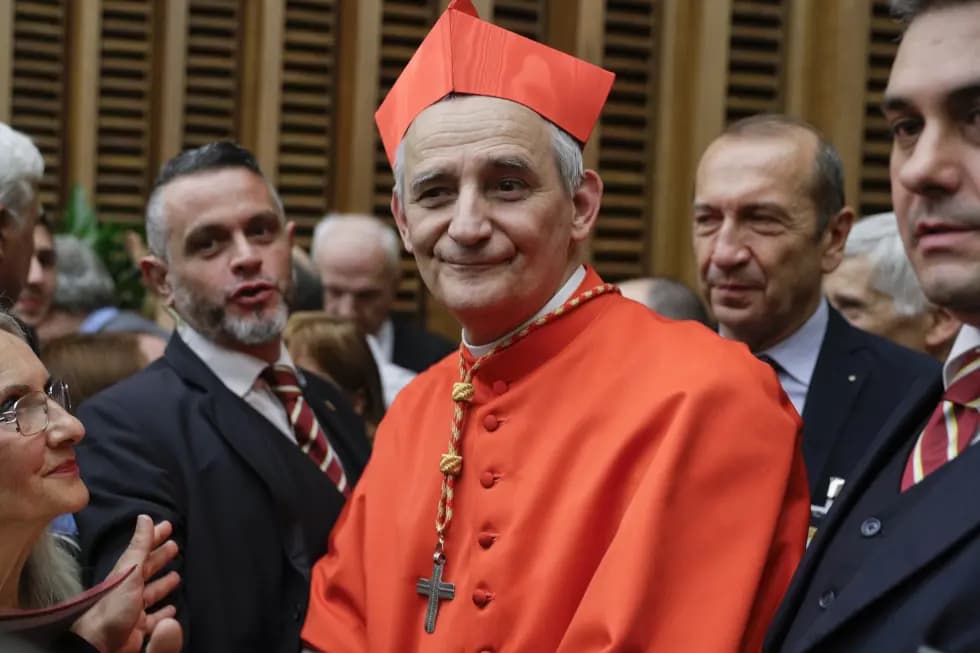ROME – After making trips to Kyiv, Moscow, and Washington D.C. as part of his peace mission on behalf of Pope Francis for the war in Ukraine, Italian Cardinal Matteo Zuppi now may be heading to Beijing, according to accounts in the Italian media.
After being named by Pope Francis as his personal peace envoy for the Ukraine war earlier this summer, Zuppi made a June 5-6 visit to Kyiv, where he met Ukrainian President Volodymyr Zelensky and other top-level Church and government leaders, and to Moscow June 28-29, where he met members of Russia’s foreign ministry as well as Patriarch Kirill of Moscow, but did not meet with President Vladimir Putin.
One of the main talking points during each visit was prisoner exchanges between Russia and Ukraine, as well as the return of Ukrainian children forcibly deported to Russia – a request that Ukrainian President Volodymyr Zelenskyy made of the Vatican during a visit to Rome in May.
According to Kyiv, there are roughly 19,592 children so far that have been taken from Ukraine and deported to Russia.
For help on these issues, Zuppi has also sought to engage the United States and China.
He recently concluded the third stage of his mission, in which he visited Washington D.C. from July 17-19, meeting with United States President Joe Biden, members of the U.S. Commission on Security and Cooperation in Europe, participants in the Senate Prayer Breakfast, and top U.S. ecclesial authorities.
Various Italian media outlets have reported that the next stage of Zuppi’s mission will be to visit Beijing, where he will meet with Chinese authorities to discuss humanitarian and other peace initiatives, including the facilitation of prisoner exchanges and the return of Ukrainian children.
Chinese officials are apparently willing to host Zuppi, whose visit has reportedly already been approved and the dates for which are being organized. Some observers suggest it could come as early as mid-August.
Should Zuppi visit Beijing, it would mark a significant step forward in terms of Vatican-China relations, as the two have not had formal diplomatic ties for more than 70 years, when Chinese leader Mao took power and forced the then-nuncio to China, Archbishop Antonio Riberi, to leave two years later.
Zuppi’s visit to Beijing would mark the first visit of a high-level official since Cardinal Roger Etchegaray went in 1980, making subsequent visits for conferences for other reasons in 1993, 2000, and 2003, according to a statement made by Etchegaray himself to the media in 2010.
So far, China, which has a strong relationship with Russia, has walked a careful line on the Russia-Ukraine war, refusing to condemn Russia’s Feb. 24, 2022, invasion, but calling on parties to avoid attacks on major civilian infrastructure. China has also urged parties at United Nations venues to resume talks on food securing and the resumption of grain and fertilizer exports.
China generally takes a policy of non-interference when it comes to conflicts outside of its own borders, but is increasingly seen as a potential mediator in the Ukraine-Russia war.
According to Marco Impagliazzo, president of the Sant’Egidio Community, Zuppi’s visit to China “is not only possible, but desirable. China is a fundamental interlocutor in the global geopolitical balance and can have an influence on Russia.”
Zuppi’s visit, and the willingness of Chinese officials to receive him, would also come amid increased efforts by the Vatican to push for more formal relations.
In a recent interview with Vatican News, Vatican Secretary of State Italian Cardinal Pietro Parolin addressed the pope’s decision to recognize the transfer of a bishop in China earlier this year without his knowledge or approval despite the fact that it violates the terms of a 2018 provisional agreement on episcopal appointments.
Parolin said Pope Francis made the decision “in view of the greater good of the diocese and the fruitful exercise” of the bishop’s ministry there.
He stressed the need for greater collaboration between Holy See and Chinese authorities on these decisions and said a “stable liaison office” would be “extremely helpful” in facilitating further dialogue and ensuring collaboration on all decisions regarding episcopal appointments.
A source with knowledge of the proposal for the liaison office has stressed that Vatican officials have been pushing for a permanent presence in China for “a long time” and that they want the office to be in Beijing, but insisted that it would not be “a diplomatic” presence.
Rather, the idea is to have a permanent representative to help ensure that decisions, particularly those regarding episcopal appointments in light of the 2018 agreement, are made in collaboration, and to establish a consistent and regular communication between Chinese bishops and Rome.
Zuppi’s visit to China thus likely would be seen not only as an attempt to de-escalate the Russia-Ukraine war, but also as part of the Vatican’s own long-term agenda of forging stronger ties with China.
Follow Elise Ann Allen on Twitter: @eliseannallen












